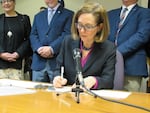
Oregon Governor Kate Brown signs a drought emergency declaration in Klamath Falls on Tuesday, March 13, 2018.
Liam Moriarty / Jefferson Public Radio
A small business tax break proposed by Gov. Kate Brown last week could mean a $15 million annual hit to state coffers, according to the state’s Legislative Revenue Office.
Officials say that figure still needs to be refined, but if it’s right, it’s a comparative drop in the bucket compared to a hefty decision Brown made earlier this month.
In an announcement April 6, the governor said she’d sign a bill to formally disconnect from part of the federal tax plan signed by Congress last year. In doing so, Brown ensured that so-called pass-through businesses in Oregon wouldn’t get a break on their state taxes worth more than $1 billion in the coming years.
The decision irked business interests and Republicans, who argued Oregon businesses could use a break, and rushed to paint the decision as a tax hike.
Brown pointed out at the time that many of those businesses already receive a favorable tax rate in Oregon, and that they’d still be getting an additional federal tax break. She suggested adding a further benefit would amount to “the third tax break at the expense of our schools, our children and our seniors.”
But the governor also offered a token of good will. Brown said she’d call a special session of the state’s Legislative Assembly to extend a favorable tax rate to one type of business that doesn’t receive it: sole proprietorships.
Brown couldn’t say at the time how much money the state would forego with such a cut. Now, legislative revenue staffers are getting close to an answer.
“We still need to do some refinement for certain details, but our current preliminary estimate is in the neighborhood of $15 [million per year] for added cost,” says Chris Allanach, the state’s acting legislative revenue officer.
That analysis is based on a tax break to Oregon businesses that file Schedule C forms with the state, Allanach said. It’s not clear if all of those would be eligible for the break Brown has in mind. Those details are expected to be hashed out during the special session she plans to call.
That special session would be Brown’s first, and comes as she faces a re-election fight this year. The governor's office has not indicated when a session might take place.
